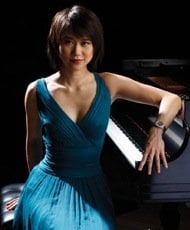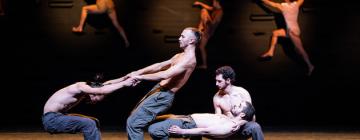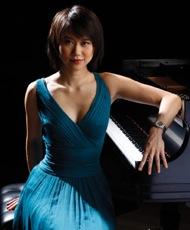
Big parties can be a kick. The size of the room, the buzz of the crowd, and the eye-popping things people wear ramp up the heat. The collective urge to get louder and a little unruly, to say and do things you might not in a smaller setting, is hard to resist. Those hoping for quiet, intimate exchanges will have their work cut out for them.
That was the inherent challenge built into Tuesday’s concert at Davies Symphony Hall. With the richly gifted and frankly glamorous pianist Yuja Wang as the big draw, a good-sized crowd assembled for a program of chamber music. Members of the San Francisco Symphony were Wang’s partners. Evidence of a certain disconnect between venue and repertoire came early and often, as the audience interrupted both works on the bill with applause after every movement. The sight and sound of five musicians in a hall built for a full orchestra seemed to disorient people enough to make them abandon their normal musical manners.
But the performers were ready for it. They came prepared to make a splash. Before a note was played, Wang sent a tremor through the house with the very short and clingy ruffled dress she had chosen for the occasion, an electric red number with black accents that made her look like a human Las Vegas valentine. She knows how to dazzle, in all senses.
In a way, Wang was sending the right signal about the music itself. By programming two of the most familiar, expressively forthcoming, and emotionally galvanizing works in the chamber repertoire — Dvořák’s Quintet in A Major, Op. 81, and Brahms’ Quintet in F Minor, Op. 34 — the musicians set the terms of the evening up front. This was going to be showy, hard-charging night full of big gestures, ingratiating melodies, bubbling wit, and the stormy outbursts every party needs to make it memorable.
All this and more — and sometimes less — came to pass by the time the revelers left off their second standing ovation and went home for the night. But before the performance itself comes under closer scrutiny, it’s worth reflecting on another aspect of this event: the spontaneous, improvised nature of the onstage gathering itself. Wang wasn’t joining up with some well-oiled name quartet whose members know each other’s likely moves and choices inside out and backward. These were musicians from the Symphony ranks, assembled to celebrate on the spot with the brilliant young pianist (she’s 24) during her Project San Francisco artist in resident stint with the organization this month.
Chamber music lovers, and players, relish this sort of thing. What will very good musicians discover about the music and each other when they haven’t worked it all out thoroughly in advance? Where will the mood and temperament of the moment lead them? Will they really listen and react to each other, or never fully connect?
As it turned out, even the limited degree of preparation for the concert was subject to the vagaries of circumstance. Illness forced violinist Paul Brancato to withdraw from the Dvořák. He was replaced by Amy Hiraga. And Wang’s own fitness to play hovered like an unanswered question. Having withdrawn from her scheduled June 21 recital due to an announced arm injury, could she be at full strength for her duties here?
Keyboard Work Surges, Ripples, Rushes
The pianist decisively put any apprehensions to rest. Wang’s playing throughout was lucid, graceful, forceful when it needed to be, sly, and good-humored (if, it must be added, sometimes a tad overbearing). She was especially impressive in the Brahms, where her rhythmic force and supple phrasing ran through this magnificent work like a powerful river, surging in torrents, opening out to becalmed wide turns and taking off in sudden giddy rushes. She was met and matched every inch of the way by the vibrant string players, who were attuned to every shift of the score’s many currents.
Even as they rode through the four contrasting movements in tight accord, this was a performance where the distinct voices and character of the players remained vitally intact. A certain unresolved questioning, a kind of subliminal tension, energized the piece. No one got shouted down or submerged. Every idea and inspiration shone through. Violinist Melissa Kleinbart’s restrained vibrato and elegant long lines lent a somber austerity. Cellist Amos Yang subtly differed, with his plangent, yearning tone. Yun Jie Liu’s viola was both warm and wistful. Dan Carlson, on second violin, was tactful yet insistent.
The opening Allegro was at once voluptuous and restlessly charged. Mighty assertions were offset by worrying afterthoughts, the themes and their development both discursive and lean. The Andante opened with a confiding, whispery plushness that revealed a tensile strength underneath. Wang gave the Scherzo its frantic thrust, a controlled panic shared by one and all. The great Finale opened in a mysterious, almost creaky manner that may have been one of the most delicious discoveries of the night. Everything unfolded from that, as the movement acquired velocity and drama without losing sight of the almost eerie premonitions at the outset.
The risks of an evening like this were more apparent in the Dvořák Quintet, which featured Yukiko Kurakata and late-sub Hiraga on violin, violist Katie Kadarauch, and cellist Peter Wyrick. There was, to be sure, some enchanting dialogue throughout. Wyrick’s pensive statement of the theme and Kadarauch’s pithy responses stood out in the opening Allegro. The Dumka had an airy sense of space and light, while the Scherzo shimmered and took flight like something weightless.
But there were also some stutters, where the players seemed not to be attending to each other’s entrances and inflections closely enough. The jaunty melancholia of Dvořák’s folk tunes didn’t come across. The final Allegro, elegant as it was, lacked muscle. The violins receded too much and too often. The humor and vitality of the whole never quite fully ripened.
Every party has its own momentum. Generally pleasing as it was, the first half of the concert was just a taste of things to come. When Wang reappeared after intermission, she was dressed in a brief black cocktail dress and perched on very high platform heels. Nothing like someone daring herself to play Brahms on stilts to liven up a gathering. And damned if she and her crew didn’t pull it off.

